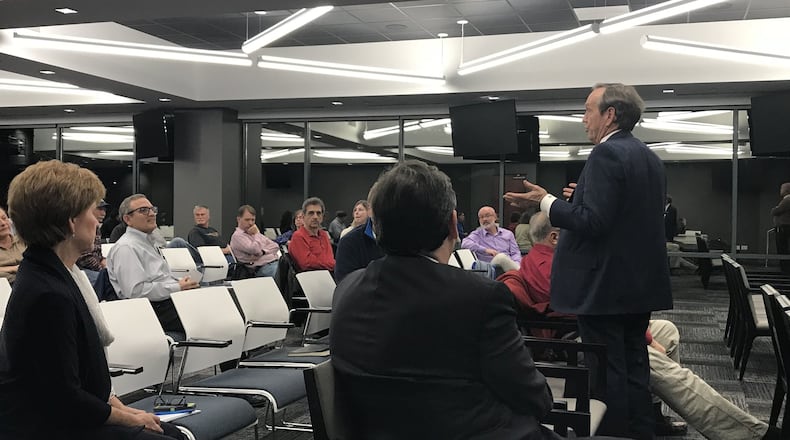Gwinnett County's largest and most populous city has a charter problem — and a whole lot of folks who are concerned about what that means for the future of the community pitched as a so-called "city lite."
Five-plus years ago, when proponents were pushing for Peachtree Corners’ creation, the city was promoted as a place that would keep government small and taxes at a minimum. And once the city was created, officials indeed wrote many of those things — service delivery restrictions, a millage rate cap — directly into the charter.
Therein lies the problem.
More on subscriber site myAJC.com: Gwinnett commissioner threatens $5M lawsuit over 'racist pig' reprimand
A recent review of that charter by the University of Georgia’s Carl Vinson Institute of Government found that those “city lite” restrictions may indeed be illegal and should be removed.
“I feel bamboozled,” one of Peachtree Corners’ most outspoken residents, Mim Harris, said this week. “I feel cheated.”
Even though leaders have vowed to use other means to maintain the city’s identity and keep the promises they made half a decade ago, the prospect of charter changes has left many other residents shaken, too.
Harris was just one of about 50 people who attended a Wednesday night public meeting about the deletions to the charter, which are likely to be taken up by legislators during the current session. The issue has gotten so contentious that Mayor Mike Mason — one of the leaders of the original pro-city movement — felt inclined to post a lengthy letter on Peachtree Corners' website this week.
“No one ever told me, or anyone with the ‘Yes Campaign,’ that what we were proposing had an unconstitutional element,” Mason wrote. “We were assured this innovative concept would work.”
But the Vinson Institute’s review, a standard five-year process that was completed in November, found red flags.
Georgia’s constitution says cities must provide at least three services, but Peachtree Corners’ current charter specifically prohibits the city from providing more than three services. That restriction is not allowed, officials said, because municipalities can’t just ignore a need if something should arise.
For instance, City Manager Brian Johnson said, should the Gwinnett County Police Department ever decide to stop patrolling Peachtree Corners, the city has to be able to make a similar service available, one way or another.
“There is no need or inclination from council to provide any service that we’re not already providing,” Johnson said Wednesday. ” … But we can’t have something in the charter that restricts that responsibility if, in fact, it came up at some point in the future.”
Peachtree Corners’ charter also includes a provision capping the city’s millage rate — which is used to calculate property taxes — at 1 mill. Such a cap is likely “impermissible” in a charter, Johnson said.
The proposed changes to the charter include removing restrictions to the number of services that can be provided by the city. The millage cap also will be removed from the charter.
The city then plans to address those issues and others by passing a handful new local ordinances during its next council meeting, which will be held Tuesday. One ordinance will declare that “public-private” and “public-public” partnerships (i.e., not directly providing services) should be the city’s preferred method of service delivery.
Another will re-cap the millage rate at 1 mill and necessitate a referendum if the city ever wants to raise it above that limit.
The city’s current millage rate is zero.
“Is there a better way to constrain the growth of a government than to constrain its revenue stream?” Johnson asked.
The concept of removing much-touted, government-limiting items from the city’s charter has, nonetheless, given more than a few residents pause.
“Why the heck,” Harris asked during Wednesday night’s meeting, “didn’t you take a deep dive [into the constitutionality of the charter] in 2011 when we were talking about ‘city lite?’”
State Sen. Fran Millar and state Rep. Scott Hilton, two of the legislators who ultimately will be responsible for the new charter’s adoption, were at the meeting. Harris asked them to consider waiting to do anything until residents could more closely review the changes.
The legislators seemed receptive but stressed their desire to get something passed this legislative session.
“All we’re doing is fixing language,” Millar said.
MYAJC.COM: REAL JOURNALISM. REAL LOCAL IMPACT.
The AJC's Tyler Estep keeps you updated on the latest happenings in Gwinnett County government and politics. You'll find more on myAJC.com, including these stories:
Never miss a minute of what's happening in Gwinnett politics. Subscribe to myAJC.com.
In other Gwinnett news:
About the Author
Keep Reading
The Latest
Featured




